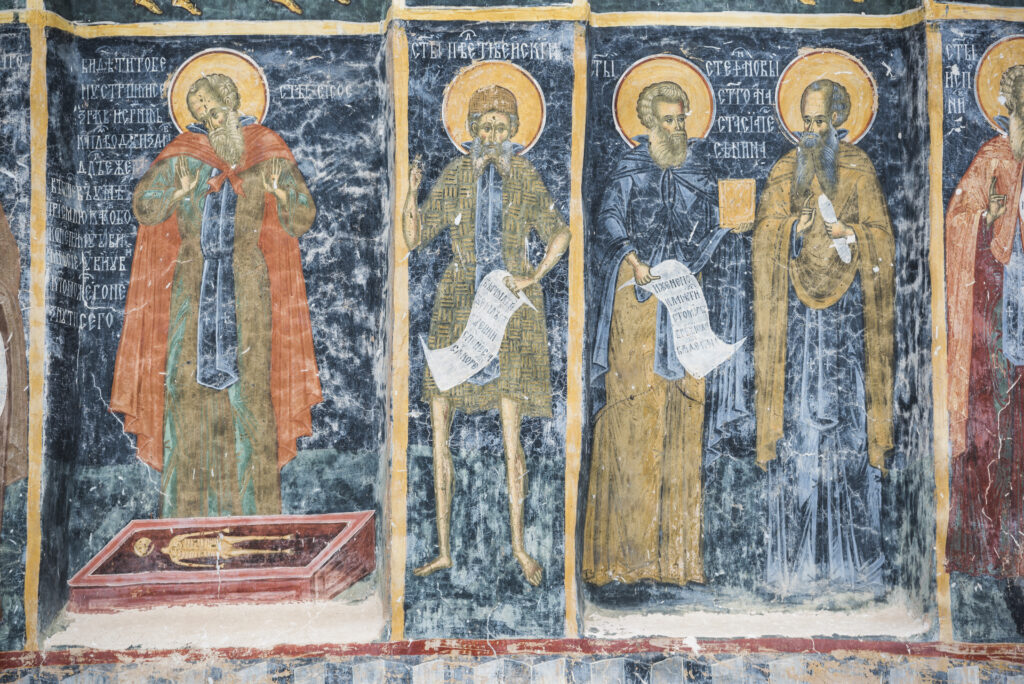
By James Rochford, article and AC
Claim:
Critics claim that Paul deliberately twisted the OT text. Paul writes that God “gave gifts to men” (Eph. 4:8). However, in the original text, we read that God “received gifts among men” (Ps. 68:18). Which is true?
Response:
A number of points can be made.
First, we need to consider the context of Psalm 68. This psalm is a plea with God to liberate his people the way he did back in the old days. In verse 7, God walked in triumph in front of the people. In verses 11-14, the kings scattered before him. The transfer of the ark to Zion is made analogous to the march of Yahweh, conquering his enemies. Normally, when a conqueror returned home from battle, he would take his booty and distribute it to the people, rather than receive it.
Second, “It is not without significance that two ancient versions or translations, one Aramaic and the other Syriac, render it ‘gave’. So evidently this was already a traditional interpretation.”[1]
Third, therefore, understanding both the original context and the original language, Paul shows Christ as giving out gifts, when he is raised. We see the same theme in Acts 2:33, when Peter says, “Therefore having been exalted to the right hand of God, and having received from the Father the promise of the Holy Spirit, He has poured forth this which you both see and hear.” In other words, Christ –similar to an ancient conqueror for his people (Ps. 68) –was received from God only to give to us.
- ^ Stott, John R. W.: God’s New Society : The Message of Ephesians. Downers Grove, Ill. : InterVarsity Press, 1979, 1980. 157.
“In the Hebrew text it is, ‘thou hast ascended’; there the psalmist speaks to the Messiah, here the apostle speaks of him… wherefore the Jews have no reason to quarrel with the version of the apostle as they do; who, instead of ‘received gifts for’ men, renders it, ‘gave gifts to men’; since the Messiah received in order to give, and gives in consequence of his having received them; and so Jarchi interprets the words, ‘to give them’ to the children of men; and besides, as a learned man has observed, one and the same Hebrew word signifies to give and to receive; to which may be added that their own Targum renders it ‘and hast given gifts to the children of men’…” – Gill’s Exposition of the Entire Bible
Eric C. Redmond
Eric C. Redmond, in his article “The Use of Psalm 68 in Ephesians 4: A Typological Approach Toward a Solution” (Southeastern Theological Review 13.2 [2022]: 3-13), argues that Paul’s use of Psalm 68:18 in Ephesians 4:8 reflects a deliberate typological interpretation rooted in the exodus narrative, particularly in the pattern of Moses’s ascents up Mount Sinai. The difficulty arises because Paul appears to modify the verse in three key ways: (1) he changes the pronoun from second person (“You ascended,” עָלִיתָ, ‘ālîtā) to third person (“He ascended,” ἀνέβη), (2) he changes the verb from “received gifts” (לָקַחְתָּ, lāqaḥtā; LXX: ἔλαβες) to “gave gifts” (ἔδωκεν), and (3) he applies this language to Christ rather than to God or Moses. Redmond contends that rather than introducing a misquotation or a midrashic embellishment, Paul is offering a typological exegesis in which he sees the ascension of Christ as the fulfillment of what Psalm 68 anticipated. The original psalm is a triumphal hymn celebrating God’s victorious ascent to Mount Zion following His defeat of Israel’s enemies in the wilderness (Ps 68:1-6, 17-18, 35-36). The phrase “You ascended on high, you led captivity captive, you received gifts among men” (Ps 68:18) is understood by the Targum of the Psalms as referring not to God directly, but to Moses: “You ascended to the firmament, O Moses the prophet… you gave the words of the Law as gifts” (Tg. Ps. 68:19). Paul follows this traditional Jewish understanding, but interprets the text Christologically Christ, as the new and greater Moses, ascends not Mount Sinai but the heavens (Eph 4:9–10), not to receive the Law, but to distribute the gifts of the Spirit to His people (Eph 4:11-12). Redmond notes, “Paul, seeing Christ in the pattern of Moses, finds the fulfillment of the typology and the psalm in the work of Christ.” Importantly, other verses within Psalm 68 support this divine gift-giving theme: “The Lord gave the word” (Ps 68:11), “the God of Israel gives power and strength to His people” (Ps 68:35-36). Thus, Paul’s adaptation is not contrary to the psalm’s theology, but consistent with its broader message when read in light of Christ’s redemptive work.
This typological method is not unfamiliar in Paul’s writings. A similar example is found in 1 Corinthians 6:9, where Paul lists several vices and includes the rare compound word ἀρσενοκοῖται (“men who have sex with men”). Scholars such as Gordon Fee and Robert Gagnon have noted that this term does not appear in Greek literature before Paul, but is likely a deliberate combination of two Greek words from the Septuagint version of Leviticus 18:22 and 20:13: ἄρσενος (“male”) and κοίτην (“bed”) [1-2]. This neologism reveals Paul’s exegetical technique of drawing from the Old Testament’s linguistic and moral vocabulary to craft new expressions tailored to his theological and pastoral context. Just as he combines and adapts terms in 1 Corinthians 6:9 to reflect the moral content of Torah law, so too in Ephesians 4:8 Paul adapts the wording of Psalm 68:18 to express the typological fulfillment of God’s triumph in Christ. Both cases reflect Paul’s deep engagement with the Hebrew Scriptures through a lens shaped by Christ’s death, resurrection, and exaltation.
- “The best guess is that it is immediately followed by a word that does seem to refer to male homosexuality, especially to the active partner. This word (arsenokoitai), however, is also difficult. This is its first appearance in preserved literature, and subsequent authors are reluctant to use it, especially when describing homosexual activity. The word is a compound of ‘male’ and ‘intercourse.’ There is no question as to the meaning of the koitai part of the word; it is vulgar slang for ‘intercourse’ (which probably accounts for its seldom being found in the literature).” – Fee, Gordon D. The First Epistle to the Corinthians. New International Commentary on the New Testament, Eerdmans, 1987, p. 244
- “(7) Appropriated by the New Testament. The prohibition is clearly picked up in the New Testament. The term arsenokoitai (“men who lie with a male”) in 1 Corinthians 6:9 is formulated from the Septuagint translation of Lev 18:22 and 20:13, which refers to not “lying” (koite) with a “male” (arsen). Paul’s critique of homosexual relations in Romans 1:24–27 also echoes Lev 18 and 20 by using two terms that appear in the Septuagint translation of these chapters: akatharsia (“uncleanness, impurity” in Romans 1:24 and Lev 18:19; 20:21, 25) and aschemosune (“indecency, indecent exposure” in Rom 1:27 and twenty-four times in Lev 18:6–19; 20:11, 17–21).” – Gagnon, Robert A. J. “Why the Disagreement over the Biblical Witness on Homosexual Practice? A Response to Myers and Scanzoni, What God Has Joined Together?” Theology Matters, vol. 11, no. 1, 2005, p. 53
Dr. Gregory K. Beale
“In the light of our overall discussion, the proposal of many that the NT’s exegetical approach to the OT is characteristically non-contextual is a substantial overstatement. It would take more space than allowed in this article to discuss all the relevant cases where the OT is used in the NT, but the present aim has been to focus on methodological and presuppositional issues which often influence the exegetical task itself. I remain convinced that once the hermeneutical and theological presuppositions of the NT writers are considered, there are no clear examples where they have developed a meaning from the OT which is inconsistent or contradictory to some aspect of the original OT intention. [26] However, there will probably always remain some enigmatic passages that are hard to understand under any reading.”
[26] This conclusion is corroborated by the articles of Moo, ‘The Problem of Sensus Plenior,’ R. Nicole, ‘The New Testament Use of the Old Testament’ in Revelation and the Bible, ed. C. F. H. Henry (Grand Rapids: Baker, 1958), 135-151 and idem., ‘The Old Testament in the New Testament’ in The Expositor’s Bible Commentary I, ed. F. E. Gaebelein (Grand Rapids: Zondervan, 1979), 617-628.
Beale, Gregory K. “The Right Doctrine, Wrong Texts: Can We Follow the Apostles’ Doctrine but Not Their Hermeneutics?” Themelios, vol. 14, no. 3, 1989, p. 41. PDF, p. 4.






Wow superb blog layout How long have you been blogging for you make blogging look easy The overall look of your site is magnificent as well as the content
You really make it seem so easy together with your presentation but I find this matter to be actually something which I think I’d never understand. It seems too complex and extremely large for me. I am taking a look ahead in your next put up, I¦ll attempt to get the cling of it!
Whats Happening i am new to this, I stumbled upon this I have found It absolutely useful and it has aided me out loads. I hope to contribute & help different customers like its helped me. Great job.
I love your writing style truly enjoying this web site.
I was recommended this web site by my cousin. I am not sure whether this post is written by him as nobody else know such detailed about my difficulty. You’re wonderful! Thanks!
It?¦s actually a great and helpful piece of information. I?¦m satisfied that you just shared this useful info with us. Please keep us informed like this. Thank you for sharing.
I like this website very much, Its a very nice position to read and incur info .
I gotta favorite this web site it seems handy very useful